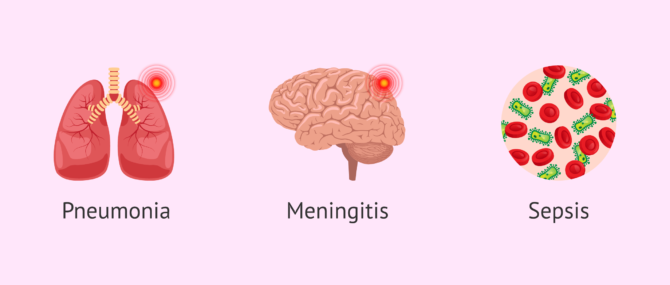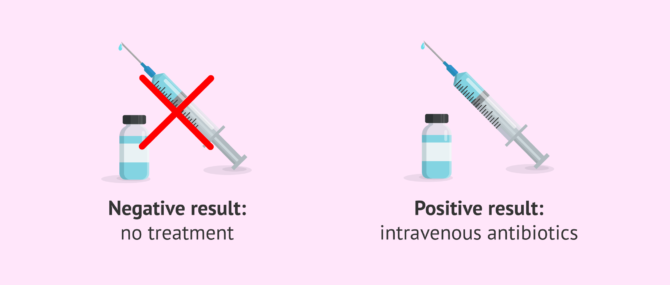Group B streptococcus (GBS), or Streptococcus agalactiae is a bacterium that some women have in the gastrointestinal and/or genitourinary tract. Generally, this bacterium does not cause symptoms in healthy adults, but it can cause severe (even fatal) infections in newborns.
Therefore, it is important to detect which women have this bacterium with a test for group B streptococcus in pregnancy. This allows for treatment with antibiotic prophylaxis to be carried out to reduce the risk of the baby developing a GBS infection after coming into contact with the bacteria during delivery.
Provided below is an index with the 8 points we are going to expand on in this article.
- 1.
- 2.
- 3.
- 4.
- 5.
- 5.1.
- 5.2.
- 5.3.
- 6.
- 7.
- 8.
Why does GBS in pregnancy occur?
Group B streptococcus is a bacterium that does not usually cause symptoms in healthy adults. Therefore, some women will have this bacterium in their genitourinary and/or gastrointestinal tract and are unaware of it.
However, this bacterium can cause very serious problems in newborns, such as pneumonia, meningitis or sepsis, and can even be fatal. Because of this, it is important to screen pregnant women for GBS (even if they do not have any symptoms), as they could transmit it to the baby during delivery.
In this way, if the test result is positive in the pregnant woman, the necessary measures can be taken to reduce the risk of the baby suffering a GBS infection after birth.
How is the Streptococcus b test done?
The Group B Streptococcus screening test is very simple, quick, painless and requires no prior preparation. To do this test, a small sample is simply taken from the woman's vagina and rectum with a swab, which will be sent for analysis.
Generally, it will be the gynecologist or midwife who will perform the procedure to take the sample. However, although it is not common, sometimes it is the woman herself who collects the sample at home.
When to test for group B streptococcus?
The screening test for group B streptococcus is performed during late pregnancy, between 35-37 weeks of gestation. However, it is usual to perform this test at 36 weeks.
The reason is that this test is valid for 5 weeks. Therefore, if more than 5 weeks elapse between the test and delivery, it is necessary to repeat the test.
However, in some cases, the group B strep test may be performed earlier, such as when there is a risk of preterm labor or something that raises suspicion that labor may come early.
In addition, it is important for women to be tested for the presence of this bacterium in every pregnancy, even if it was negative in a previous pregnancy. However, if the woman has had GBS infection during pregnancy or a previous baby with GBS infection, testing is not necessary, as the woman will still be given antibiotic prophylaxis at the time of delivery.
Furthermore, even if a cesarean delivery is planned, the pregnant woman should still undergo the test because, if the amniotic sac breaks, the baby could be at risk of infection.
Possible Results
When a pregnant woman is screened for group B streptococcus, there are two possible outcomes:
- Negative result
- means that at that moment there is no presence of this bacterium. Therefore, no treatment is required.
- Positive result
- GBS is present and, at the time of delivery, the woman will receive intravenous antibiotics to reduce the risk of infection in the baby. Women who are scheduled to have a cesarean delivery will not receive this treatment if labor has not started naturally.
This antibiotic treatment is not usually administered before the time of delivery, despite a positive result, because the bacteria could proliferate again and it is more important to keep it under control at the time of delivery. Therefore, it is extremely important for the woman to report the GBS test result to the medical team at the time of delivery.
The most commonly used antibiotic is usually penicillin. However, if the woman is allergic to it, an alternative antibiotic should be used.
FAQs from users
Does the streptococcal test in pregnancy have any risks?
No. The test for Group B Strep screening in pregnancy is a simple, quick, painless test that poses no risk to either mother or baby. It simply involves collecting a vagino-rectal sample with a small swab.
Is treatment for the infection needed if the strep test in pregnancy is positive?
A positive screening test for group B streptococcus (GBS) during pregnancy indicates that the bacteria are present. However, it does not necessarily mean it is causing an infection in the woman.
Therefore, the pregnant woman will generally not receive any antibiotic treatment until the time of delivery, when she will receive it intravenously to reduce the risk of GBS infection in the baby. Therefore, it is really a prophylaxis rather than a treatment.
Does the strep test in pregnancy hurt?
No. The test performed for Group B Streptococcus (GBS) screening during pregnancy is painless, as it consists only of taking a swab sample from the woman's vagina and rectum.
Recommended reading
If you are interested in learning more about other tests performed during pregnancy, we recommend you read the following article: Prenatal pregnancy control: tests, analyses and ultrasound scans.
THe GBS test is usually done at week 36 of pregnancy. If you want to know more about what happens in this week of gestation, you can visit this link: Week 36 of pregnancy.
We make a great effort to provide you with the highest quality information.
🙏 Please share this article if you liked it. 💜💜 You help us continue!
References
Brigtsen AK, Jacobsen AF, Dedi L, Melby KK, Espeland CN, Fugelseth D, Whitelaw A. Group B Streptococcus colonization at delivery is associated with maternal peripartum infection. PLoS One. 2022 Apr 1;17(4):e0264309. (View)
Di Renzo GC, Melin P, Berardi A, Blennow M, Carbonell-Estrany X, Donzelli GP, Hakansson S, Hod M, Hughes R, Kurtzer M, Poyart C, Shinwell E, Stray-Pedersen B, Wielgos M, El Helali N. Intrapartum GBS screening and antibiotic prophylaxis: a European consensus conference. J Matern Fetal Neonatal Med. 2015 May;28(7):766-82. (View)
Gill MM, Gasner S, Banken A, Park M, Weaver A, Sharpe E, Theiler R. Improving routine prenatal penicillin allergy testing for reported penicillin allergy. BMJ Open Qual. 2022 Jul;11(3):e001859. (View)
Nebreda-Martín L, Albisu-Del Campo A, Valle-Ruiz de Larrea L, González-Rodríguez G, Arana-Arri E, Paz-Pascual C. Efectividad de la autotoma del exudado vaginorrectal para el cribado prenatal de la infección por Streptococcus agalactiae. Estudio GALL [Effectiveness of the vagino-rectal exudate self-sampling for prenatal screening of Streptococcus agalactiae infection. GALL study]. Aten Primaria. 2022 Jun;54(6):102366. Spanish. (View)
Piffer S, Rizzello R, Pedron M, Dellanna L, Lauriola AL. Screening of group B Streptococcus infection in pregnancy and neonatal outcomes in the province of Trento, Italy. Infez Med. 2022 Jun 1;30(2):254-262. (View)
Tavares T, Pinho L, Bonifácio Andrade E. Group B Streptococcal Neonatal Meningitis. Clin Microbiol Rev. 2022 Apr 20;35(2):e0007921. (View)
FAQs from users: 'Does the streptococcal test in pregnancy have any risks?', 'Is treatment for the infection needed if the strep test in pregnancy is positive?' and 'Does the strep test in pregnancy hurt?'.
Authors and contributors


More information about Michelle Lorraine Embleton





If I had a negative strep B result in my last pregnancy, will it be negative again in this one?